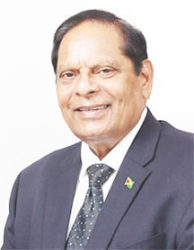Cabinet is soon to make a decision on the acceptance of technical and financial support for constitutional reform from the United Nations, while the draft bill for the Constitutional Reform Commission is to be updated by the Prime Minister’s office.
Prime Minister Moses Nagamootoo told Stabroek News on Thursday that the draft bill, which was sent to the Attorney General for review, was being returned to his office with a memorandum detailing necessary changes.
“At this change, what is important to take the [constitutional reform] process forward is to have a constitutional reform commission established and you can’t have that until there is a law under which they will function,” Nagamootoo explained, while noting that after approval from the AG the bill will be tabled in the National Assembly and sent to a Special Select Committee for further review.

Asked to provide a timeline for the process, the PM said that there is no timeline even as he acknowledged that constitutional reform is a matter of national importance. He explained that the UN has offered the government both financial and technical support and a report from a UN mission on constitutional reform is presently before Cabinet for action. “The report has been presented to Cabinet and after a decision is made it will be forwarded to the Ministry of Foreign Affairs since they coordinate support from international organisations and foreign donors,” he said, while noting that the document will be made public once Cabinet has acted on its recommendations.
Last November, Nagamootoo had said that the bill for the commission had been drafted and around $80M was being sought to move the process along.
Additionally, last month a team of UN experts presented a report of their visit to Guyana to Nagamootoo. The team visited in February and conducted a constitutional assessment mission to advise the government and to provide UN decision makers with context for their support.
The Terms of Reference that guided the mission team provided that it would, among other things, assess the political environment in Guyana and the legal and institutional framework governing the constitutional reform process and assess the potential role of UNDP-UNDPA in assisting this process and resources required.
According to a statement issued after the submission of the report, the team warned against rushing the process of constitutional reform, while stating that the timeframe for constitutional reform varies and would be dependent on variables within different countries. “Guyana, it was surmised, needed to factor in the size of its territory with regard to accessing pockets of citizens and the difficulties associated with reaching consensus,” the release said.
The APNU+AFC government has come in for strong criticism for not holding true to its promise of starting a constitutional reform process within 100 days of being in office.
Professor Harold Lutchman and head of the 2000 Constitution Reform Commission Ralph Ramkarran have said that neither the coalition government nor the opposition PPP/C appear to have any appetite for constitutional reform.
“What they support when they are in government is entirely different to what they support when they are out of government. The same thing they criticise when they are out of power, the same thing when they are in power they don’t see anything wrong with,” Lutchman, who was a member of the Steering Committee on Constitutional Reform (SCCR) set up by the APNU+AFC government in 2015, told Stabroek News in an interview.








